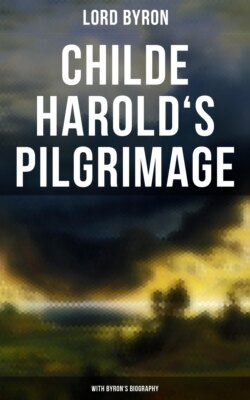Читать книгу Childe Harold's Pilgrimage (With Byron's Biography) - Lord Byron - Страница 8
На сайте Литреса книга снята с продажи.
II.
ОглавлениеCollation of First Edition, Quarto, 1812,
with MS. of the First Canto.
The MS. numbers ninety-one stanzas, the First Edition ninety-three stanzas.
Omissions from the MS.
| Stanza vii. | "Of all his train there was a henchman page,"— |
| Stanza viii. | "Him and one yeoman only did he take,"— |
| Stanza xxii. | "Unhappy Vathek! in an evil hour,"— |
| Stanza xxv. | "In golden characters right well designed,"— |
| Stanza xxvii. | "But when Convention sent his handy work,"— |
| Stanza xxviii. | "Thus unto Heaven appealed the people: Heaven,"— |
| Stanza lxxxviii. | "There may you read with spectacles on eyes,"— |
| Stanza lxxxix. | "There may you read—Oh, Phoebus, save Sir John,"— |
| Stanza xc. | "Yet here of Vulpes mention may be made,"— |
Insertions in the First Edition.
| Stanza i. | "Oh, thou! in Hellas deemed of heavenly birth,"— |
| Stanza viii. | "Yet oft-times in his maddest mirthful mood,"— |
| Stanza ix. | "And none did love him!—though to hall and bower,"— |
| Stanza xliii. | "Oh, Albuera! glorious field of grief!"— |
| Stanza lxxxv. | "Adieu, fair Cadiz! yea, a long adieu!"— |
| Stanza lxxxvi. | "Such be the sons of Spain, and strange her Fate,"— |
| Stanza lxxxviii. | "Flows there a tear of Pity for the dead?"— |
| Stanza lxxxix. | "Not yet, alas! the dreadful work is done,"— |
| Stanza xc. | "Not all the blood at Talavera shed,"— |
| Stanza xci. | "And thou, my friend!—since unavailing woe,"— |
| Stanza xcii. | "Oh, known the earliest, and esteemed the most,"— |
The MS. of the Second Canto numbers eighty stanzas; the First Edition numbers eighty-eight stanzas.
Omissions from the MS.
| Stanza viii. | "Frown not upon me, churlish Priest! that I,"— |
| Stanza xiv. | "Come, then, ye classic Thieves of each degree,"— |
| Stanza xv. | "Or will the gentle Dilettanti crew,"— |
| Stanza lxiii. | "Childe Harold with that Chief held colloquy,"— |
Insertions in the First Edition.
| Stanza viii. | "Yet if, as holiest men have deemed, there be,"— |
| Stanza ix. | "There, Thou! whose Love and Life together fled,"— |
| Stanza xv. | "Cold is the heart, fair Greece! that looks on Thee,"— |
| Stanza lii. | "Oh! where, Dodona! is thine agéd Grove?"— |
| Stanza lxiii. | "Mid many things most new to ear and eye,"— |
| Stanza lxxx. | "Where'er we tread 'tis haunted, holy ground,"— |
| Stanza lxxxiii. | "Let such approach this consecrated Land,"— |
| Stanza lxxxiv. | "For thee, who thus in too protracted song,"— |
| Stanza lxxxv. | "Thou too art gone, thou loved and lovely one!"— |
| Stanza lxxxvii. | "Then must I plunge again into the crowd,"— |
| Stanza lxxxviii. | "What is the worst of woes that wait on Age?"— |
| Stanza lxxxvi. | "Oh! ever loving, lovely, and beloved!"— |
| Stanza lxxxvii. | "Then must I plunge again into the crowd,"— |
| Stanza lxxxviii. | "What is the worst of woes that wait on Age?"— |
Additions to the Seventh Edition, 1814.
The Second Canto, in the first six editions, numbers eighty-eight stanzas; in the Seventh Edition the Second Canto numbers ninety-eight stanzas.
Additions.
| The Dedication, To Ianthe. | |
| Stanza xxvii. | "More blest the life of godly Eremite,"— |
| Stanza lxxvii. | "The city won for Allah from the Giaour,"— |
| Stanza lxxviii. | "Yet mark their mirth, ere Lenten days begin,"— |
| Stanza lxxix. | "And whose more rife with merriment than thine,"— |
| Stanza lxxx. | "Loud was the lightsome tumult on the shore,"— |
| Stanza lxxxi. | "Glanced many a light Caique along the foam,"— |
| Stanza lxxxii. | "But, midst the throng' in merry masquerade,"— |
| Stanza lxxxiii. | "This must he feel, the true-born son of Greece,"— |
| Stanza lxxxix. | "The Sun, the soil—but not the slave, the same,"— |
| Stanza xc. | "The flying Mede, his shaftless broken bow,"— |
